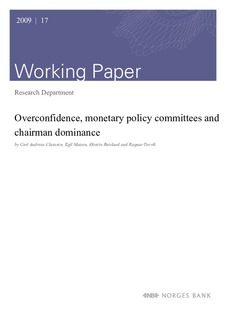Overconfidence, Monetary Policy Committees and Chairman Dominance
Working paper
Published version
Permanent lenke
http://hdl.handle.net/11250/2497624Utgivelsesdato
2009Metadata
Vis full innførselSamlinger
Sammendrag
We suggest that overconfidence among policymakers explains why formal decision power over monetary policy is given to committees, while much of the real power to set policy remains with central bank chairmen. Overconfidence implies that the chairman underweights advice from his staff, increasing policy risk if he alone decides. A committee with decision power reduces this risk, because it induces moderation from the chairman. Overconfidence also yields disagreement and dissent in the committee, consistent with evidence from monetary policy committees. As the chairman is on average better informed, through his wider access to the staff, this would give him a suboptimal influence if policy is set through simple majority voting. Giving the chairman extra decision power, through e.g. agenda-setting rights, restores his influence. A monetary policy committee with a strong chairman balances the risks and influence distortions that occur if policymakers are overconfident.

